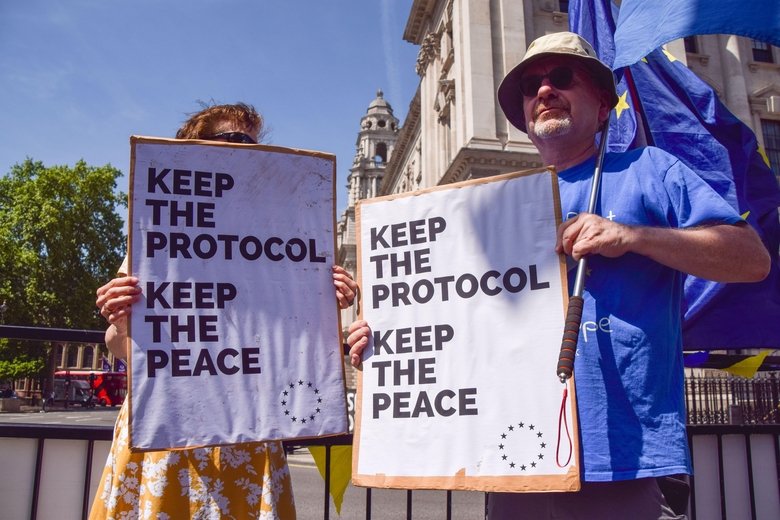With all the noise and fury they create around the Northern Ireland Protocol, it would be easy to forget that the UK government negotiated and signed it, and that it was also chosen by the DUP, by process of elimination after they voted against all other Brexit solutions. Both parties are performing incredible twists in logic in trying to separate the Protocol from the Brexit choices they have made and avoiding contrast between the frustration some unionists understandably feel (after the government broke their promise of no sea border) with complete disregard to the majority in Northern Ireland who opposed Brexit.
There was not a whisper about consent and consensus when votes were gleefully being cast for ever harder forms of Brexit. The same MPs who are lamenting a democratic deficit relating to a small number of EU regulations, rejected and sneered at attempts by my party to insert mechanisms to protect consent in successive pieces of Brexit legislation and are demonstrating their concern for democracy by holding to ransom the Northern Ireland Assembly, against the wishes of more than 70 per cent of voters who chose parties committed to power-sharing in last month’s Stormont elections. A newfound commitment to the 1998 Belfast/Good Friday Agreement is bemusing to those of us who experienced those parties fighting it tooth and nail from the moment of signing.
The DUP and UK government are studiously ignoring more and more data that shows NI’s strong economic growth relative to every other UK region outside London, due to the Protocol’s protection from Brexit. Although there are certainly issues to work through, business leaders are clear that the Protocol is working for many of them, and that further solutions are available with negotiation and good faith.
They won’t allow our economy to see the wood for the trees. Unique dual market access could position our region as a gateway to both the EU and UK single markets. Invest NI has been at pains to persuade political leaders in Britain and Northern Ireland to promote the opportunities the Protocol could offer to key industries such as life and health sciences, aerospace, and agri-food goods. Even the DUP’s own caretaker economy minister begrudgingly acknowledged the unique access to the EU and UK markets by virtue of the Protocol in an investment strategy earlier this month. These are the aspects of the Protocol that we could be focusing on, whilst challenges are worked through.


While claims of “societal disruption” are wildly overplayed, the Protocol is indeed far from perfect. The SDLP, and others, expressed grave reservations when it was signed and pushed for a longer implementation period, having advocated passionately for the benefits of borderless trade and borderless political relationships across these islands. These concerns were brushed off in the sales pitch for an oven-ready deal and businesses were given a matter of days to implement the changes. The fact is that it is working for many businesses, particularly those working North/South and involved in services.
The obvious macro solution to the issue of trade friction moving goods into Northern Ireland is a bespoke SPS and Veterinary deal, but for all the declarations of what they would do for Northern Ireland, Johnson’s government “won’t do that”.
The Protocol was designed and expected to evolve, but that requires negotiation and good faith instead of posturing, unilateral action, and a shifting bottom line. Business leaders, who have been united and clear in their opposition to the triggering of Article 16, have been making many aspects of the new systems work while advancing 5 key proposals which require movement from both the EU and UK to address the continuing concerns of the majority of businesses.
They reject Liz Truss’ mooted new dual regulatory proposals as the worst of both worlds, and they are clear that no one was bothered in the slightest about ECJ jurisdiction until David Frost inserted it as a new red line last summer. That was the tell for many people – using the cover of a combination of real and confected unionist outrage, the government have created freshly impossible asks that are impossible to achieve while protecting Northern Ireland’s single market access. Many fear that the UK’s mileage is not in the solution but in lamenting the problem. A Northern Ireland thriving due to single market access shows up the challenges of non-tariff barriers for businesses in Britain, while perpetual conflict with the “mean EU” helps to keep the old Brexit coalition together.
In the Protocol negotiations, as with Brexit as a whole, the realities and the politics are far apart. What the majority of people in Northern Ireland want, after 6 years of circular debate, is to no longer hear about Brexit in the media – morning, noon, and night. They want devolution to address hospital waiting lists, educational underachievement, and housing, issues that have blighted working-class Unionist and Nationalist communities alike, but which never seem to make it to the top of the DUP’s political agenda.
Solutions to make the Protocol work are available; but it will take negotiation and good faith, and a genuine interest in the welfare of Northern Ireland, rather than just its utility as a negotiation tool.












